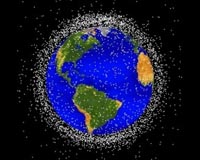 |
Washington DC (SPX) Nov 24, 2010 Sharing information on the location of space objects and debris is a prime example of addressing collective problems in space through cooperative solutions. As Earth orbit grows more congested, the need to track space objects and provide information about activities in space becomes increasingly critical for a number of reasons, such as helping to prevent collisions or debris-caused damage. Secure World Foundation is pleased to announce the release of a fact-filled issue brief on the U.S. government's Space Situational Awareness Sharing Program. The 17-page document details the history, legislation and funding of space situational awareness - or SSA - as well as describing how it works, recent changes and updates to the program. "The new U.S. National Space Policy released this past June heavily emphasizes international cooperation, a focus that has been at the center of the SSA Sharing Program since its creation," said Tiffany Chow, Research Assistant for Secure World Foundation (SWF) and author of the issue brief. Chow said that by gathering, analyzing, and sharing information on the location of space objects and debris, the United States shows its commitment to working with other space actors to ensure everyone's ability to safely operate in space for the long-term. "The SSA Sharing Program is a key area where such cooperation has been going on for years and can be expanded. However, the program's details are often little known," Chow said. "This SWF issue brief aims to illuminate those details, as well as provide analysis on the issues and concerns surrounding the program." To access the SSA Sharing Program: SWF Issue Brief, click here.
Share This Article With Planet Earth
Related Links Secure World Foundation Space Technology News - Applications and Research
 Russia To Spend 2 Bln Dollars For Space Clean-Up
Russia To Spend 2 Bln Dollars For Space Clean-UpMoscow (XNA) Nov 24, 2010 Russia's Rocket and Space Corporation Energia announced Tuesday that it will build a special orbital pod designed for sweeping-up the near-Earth space from satellite debris. The system was estimated to cost about 60 billion rubles (1.9 billion U.S. dollars). Every year, the near-Earth space becomes more and more densely populated with used satellites and their debris, said the compan ... read more |
|
| The content herein, unless otherwise known to be public domain, are Copyright 1995-2010 - SpaceDaily. AFP and UPI Wire Stories are copyright Agence France-Presse and United Press International. ESA Portal Reports are copyright European Space Agency. All NASA sourced material is public domain. Additional copyrights may apply in whole or part to other bona fide parties. Advertising does not imply endorsement,agreement or approval of any opinions, statements or information provided by SpaceDaily on any Web page published or hosted by SpaceDaily. Privacy Statement |